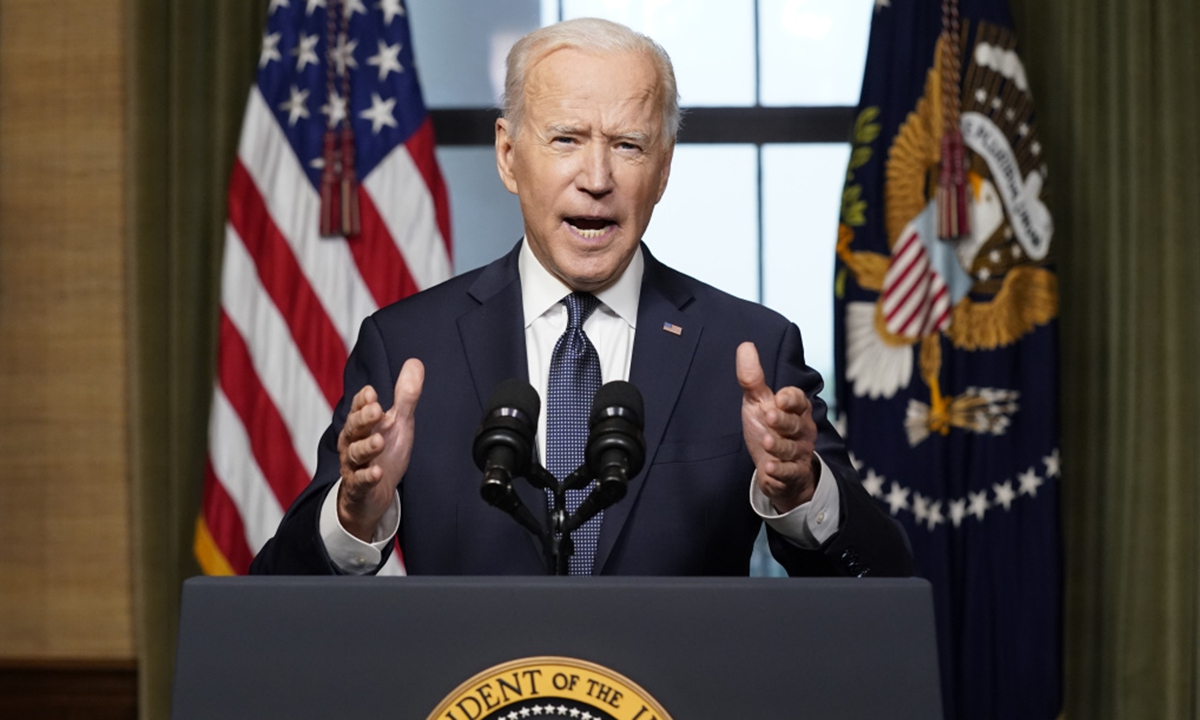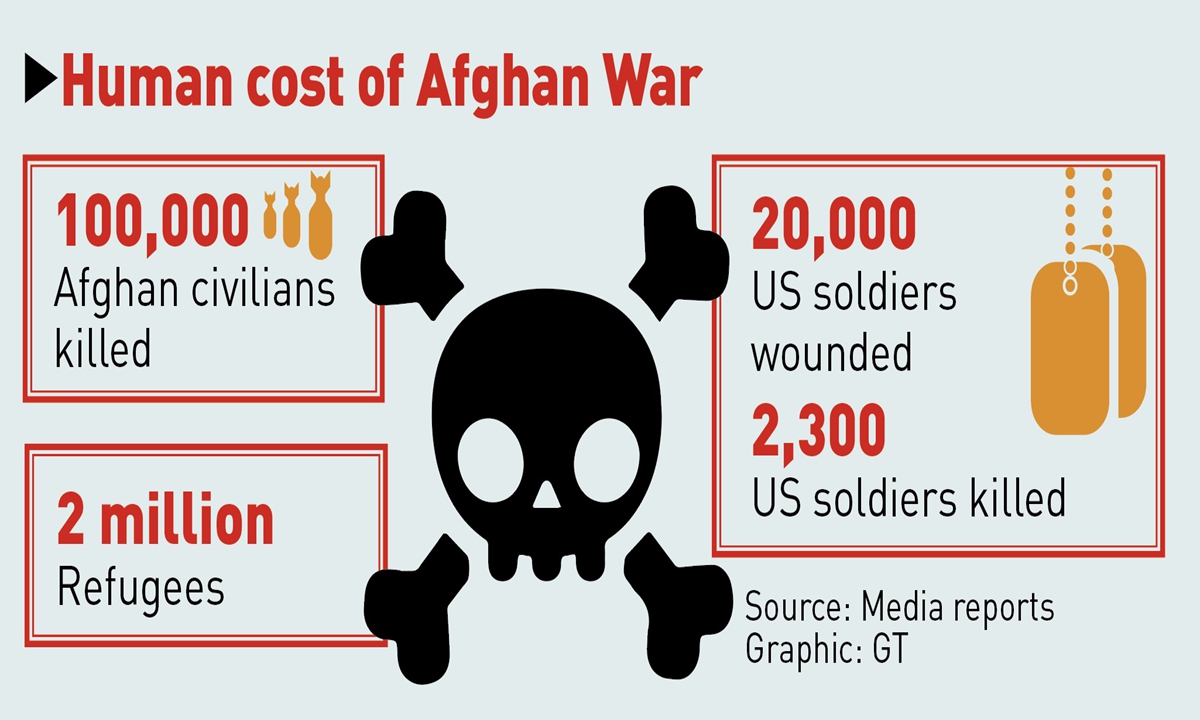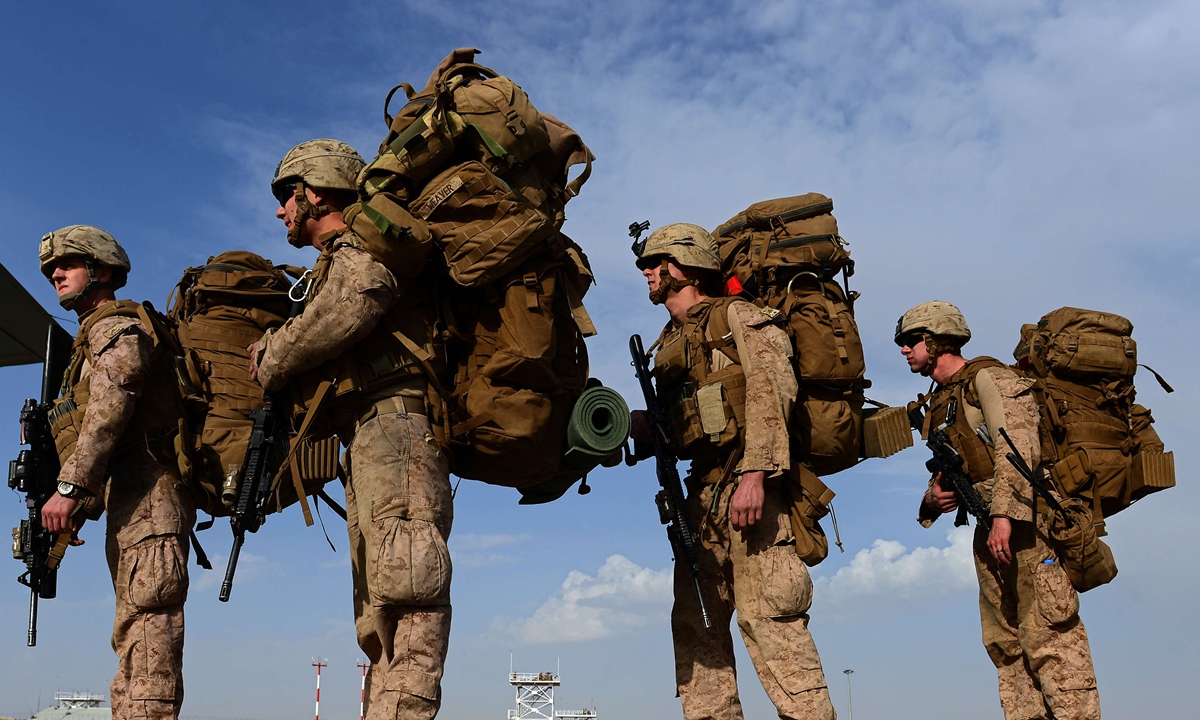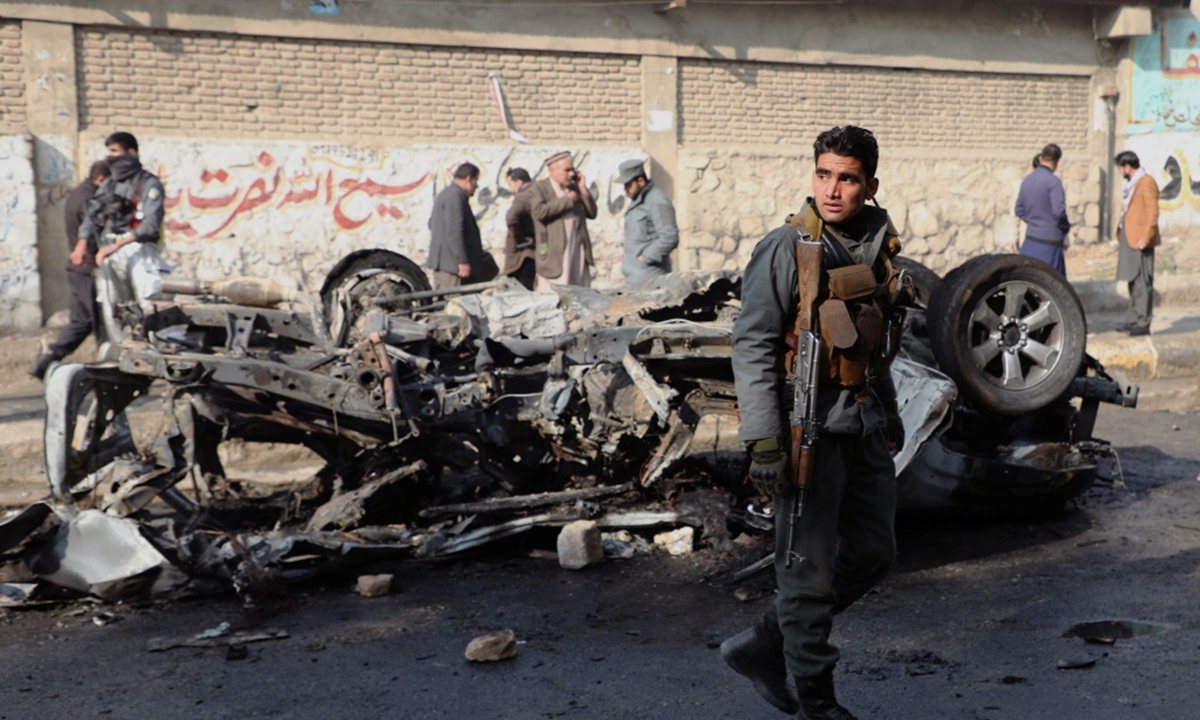
A woman observes the scene of an attack a day after a car bomb went off in Herat, Afghanistan on March 13, 2021. Photo: IC
In Afghanistan, "the Graveyard of Empires," the US has spent nearly two decades fighting the "longest war" in its history. Now, it seems that US troops are really withdrawing.
On April 14, US President Joe Biden announced the withdrawal of all American troops from Afghanistan before September 11, along with NATO troops.
However, Afghanistan has been stuck in misery in the past 20 years. The war has not only killed at least 100,000 civilians there but has also left the country with difficulties in rebuilding its economy and political system. To all that Afghanistan is suffering, the US has an inescapable responsibility.
Some analysts believe that the US withdrawal from Afghanistan is to transfer its attention to superpower rivalries. But its withdrawal is shirking a massive responsibility and could worsen the chaotic security and political situation in Afghanistan, and even foment extreme terrorist forces around the world.
Some Afghan and Pakistani experts reached by the Global Times said the anti-terrorism war declared by the US is a failure, and the US must withdraw by paying toward its responsibilities.
But after 20 years with the US bungling its operations, Afghans have to rely on themselves to seek peace and future prosperity.
US' turn to loseIt is quite symbolic for the Biden government to choose September 11 as the deadline for its withdrawal from Afghanistan, given its significance from the September 11, 2001 twin tower crash orchestrated by the Al-Qaeda, which shook America to its core. In a bid to destroy Al-Qaeda, under the guise of protecting local and global security, the US initiated the war in Afghanistan on October 7, 2001.

US President Joe Biden speaks from the Treaty Room at the White House on April 14, 2021, about the withdrawal of the remainder of U.S. troops from Afghanistan. Photo: IC
The US quickly occupied Kabul and dismantled the Taliban regime. Despite this, the US sank even deeper into this war, increasing its troop presence in Afghanistan in 2010. At its peak, there were 100,000 American troops garrisoned in Afghanistan.
The US did not gradually cut its troops until May 2011, when Osama bin Laden was finally killed.
In 2001, when George W. Bush declared war on Afghanistan at the Treaty Room in the White House, he vowed that this would be a different kind of war, and no matter how long it took, the US would ultimately claim victory.
About 20 years later, in the same room, President Biden announced the end of the Afghan war, saying that the US has completed the goal of counterterrorism. "I've concluded it's time to end America's longest war," Biden said. "It's time for American troops to come home," he added.
But surveys in the US showed that many people see it as a "lost war." In 20 years, more than 20,000 US soldiers and officers were wounded in Afghanistan, and 2,300 were killed.

Human cost of Afghan War Graphic: GT
There will no longer be a foreign troop presence in Afghanistan after the US withdrawal. Afghanistan is often known as the "Graveyard of Empires," because the foreign invaders who thought they would make great military advances all lost their battles in the mountains and deserts, confronted by the stubborn resistance of Afghan tribes.
An editorial of Russia's Nezavisimaya Gazeta pointed out that the US could ultimately negatively impact the future of Afghanistan. It is almost certain that the Taliban will play a bigger role than the US did in Afghan politics.
Bilal Shaukat, a researcher at the Institute of Peace and Conflict Studies, University of Peshawar, told the Global Times that if the aim of initiating the war was only to eliminate the Al-Qaeda, then the US troops were successful. But in a broader sense, this "counterterrorism war" is a failure, as the US attained nothing from it.
Terrorist attacks persist, and the war has claimed numerous Afghan civilian casualties while causing massive internal displacement and a refugee crisis, Shaukat said.
He noted that if the US had invested the large sums of money spent on this war into education, medical care, and other humanitarian activities in Afghanistan, the benefits of the money would be incalculable.
Zhu Yongbiao from the Center for Afghanistan Studies in Lanzhou University told the Global Times that about half of the civilian casualties in Afghanistan in the past 20 years were related to the US troops. The war also led to 2 million people becoming refugees and caused huge losses.
"Because of the self-interest of the US, what is left is a split and chaotic country, which will have a negative impact on Afghanistan and the region for a long time," Zhu said.
Failed US narrative The Biden administration's withdrawal timetable is months behind the May 1 deadline agreed upon in talks between the Afghan Taliban and the Trump administration last year. In this regard, Nikita Danyuk, deputy director of the Institute of Strategic Studies and Forecasting at the Russian People's Friendship University, said that the US is deliberately refusing to fulfill its obligations and looking for a reason to continue to use the military infrastructure built during its 20-year stay in Afghanistan.
In any case, the US is likely to leave Afghanistan with a mess on its hands. Some Russian media believe that the US has always claimed that it is "the arbiter and policeman of the world," but the war in Afghanistan has become a costly and lasting geopolitical humiliation for Washington."
After the 20-year war, American troops had to negotiate a peace deal with the Taliban and withdraw from Afghanistan, a betrayal of the Afghan government.
Michael E. O 'Hanlon, a senior fellow at the US think tank Brookings Institution, worries the withdrawal plan could lead to a civil war, ethnic cleansing, fragmentation of Afghanistan, and the risk of making the country a haven for terrorists.
Hujjatullah Zia, a Kabul-based columnist for Daily Outlook Afghanistan, told the Global Times that there is widespread disappointment and concern among the Afghan people over the Biden administration's withdrawal plan.
The problem is that the withdrawal is likely to create a security vacuum in Afghanistan and raise concerns, such as fears of a civil war, he said.

US Marines head to Kandahar as Britis h and US forces withdraw from the Camp Bastion-Leatherneck complex in Lashkar Gah in Helmand province on October 27, 2014. Photo: VCG
Zia believes it would be responsible for the US to wait until there is a breakthrough in the internal talks before announcing the withdrawal.
The American government's narrative of the war on terror failed, so American forces and their allies want to leave, Zia said, noting that the war in Afghanistan has cost heavy sacrifices on the Afghan people and the warring parties have inflicted untold damage on civilians.
Among the regional countries, Pakistan is the most concerned about Afghanistan.
Amina Khan, director of Centre for Afghanistan, Middle East & Africa at the Institute of Strategic Studies, told the Global Times that with the Biden administration announcing the withdrawal plan, there is a risk of civil war in Afghanistan.
It is the US's responsibility to ensure some stability in Afghanistan before it leaves. Washington needs to put pressure on Kabul and the Taliban to make progress in peace talks between them, or to force either or both sides to compromise, she noted.
Khan pointed out that the US needs to persuade the government in Kabul to relinquish power and accept a new political arrangement, and also needs to pressure the Taliban to actually reduce violence.
Mosharraf Zaidi, CEO and Senior Fellow of Islamabad-based think tank Tabadlab, told the Global Times that the US repeatedly refused to accept the highly complex political reality of Afghan in the past and was the cause of this prolonged war.
He stressed that whether the Biden administration's withdrawal plan will be good or bad for Afghanistan depends on the direction of the peace process. If the Taliban were to step up their offensive, there would be troublesome consequences for Afghanistan and the region.
Afghanistan covers an area of about 650,000 square kilometers and has a population of about 32.2 million. More than 85 percent of the country is Sunni Muslim.
Since falling from power in 2001, the Taliban, on the defensive, have never given up their armed struggle, and even recently threatened to resume attacks if US and NATO troops do not withdraw as scheduled. In some ethnically Pashtun areas of eastern and southern Afghanistan, the Taliban still have some influence.
Ordinary people in Kabul mostly believe that US troops should leave the country altogether, but others say that the presence of US troops is a deterrent to ensure that Afghanistan does not fall back into the hands of the Taliban.
Amar, a public relations manager of Capacity for Afghanistan Think Tank (C4A) in Afghanistan, said that Afghans are full of expectations for a real peaceful outcome.
Before the outbreak of the pandemic, the Afghan government had encouraged foreign investment, so foreign businessmen including Chinese investors successively tested the waters in the Afghan market.
According to him, the Afghan government once offered a Chinese businessman a 20-year free land-use right to set up a factory. In previous years, a lack of electricity had forced the Kabul government to rotate power to neighborhoods and build new buildings in relatively safe, affluent neighborhoods.
Amar said the influx of foreign investment has brought new things to Kabul, such as roads and buildings being built in many places, and there are almost no power cuts at present.
Currently, Afghanistan's GDP per capita is only more than $580. The Global Times learned that the people's livelihoods in Afghanistan have not changed significantly in the past years. Regular Kabul police officers interviewed by the reporter received a monthly salary of about 1,200 yuan ($185), but a kilogram of beef or mutton at the supermarket costs about 40 yuan. The monthly income of university teachers is about 1,500 yuan to 3,000 yuan, which is considered to be middle to high income in the local area. Checkpoints are still in place in key parts of Kabul, as terrorist attacks continue to happen from time to time.

An Afghan police officer keeps watch at the site of a bomb blast in Kabul, Afghanistan on January 10, 2021. Photo: IC
Continued 'proxy war'After announcing the withdrawal of American troops from Afghanistan, the Biden administration is also fretting about whether Pakistan, Russia, China, India, and Turkey will do more in Afghanistan, fearing that other countries may fill the void left by the withdrawal of the US, according to Russian media outlets.
"We have to shore up American competitiveness to meet the stiff competition we're facing from an increasingly assertive China," Biden said.
Niu Xinchun, the director of Institute of Middle East Studies at China Institutes of Contemporary International Relations, wrote in an article the main purpose of US public opinion to play up the US' withdrawal is for the country to concentrate energy to deal with China, and it is to find an "excuse" for the US' embarrassing withdrawal.
For some time, the US military presence in Afghanistan has been described by some international observers as a "flimsy." However, Zhu Yongbiao said, objectively speaking, the US has gained enormous benefits from the 20-year war in Afghanistan - not only through the anti-terrorism alliance to maintain the hegemony of the US system, but also expand the US overseas garrison to the central and western regions in Asia, Many new weapons and strategic and tactical methods were tested in Afghanistan.
He believed that the US has strengthened its strategic threat to China, Russia, Iran, and other countries through the war in Afghanistan, which has contained or consumed the strategic resources of relevant countries.
Zhu believed that after the withdrawal of the US, Afghanistan may be dragged into the stage of a "proxy war," and even regional powers such as India and Pakistan will increase support for the proxy in explicit or implicit ways. At the same time, extremist and drug-related forces will seek a safe haven in Afghanistan. He said that the complete withdrawal of American troops from Afghanistan will also embolden extremist terrorist forces around the world. Some analysts said that if the situation in Afghanistan is unstable in the future, the negative impact on China's western border region will be long-term and complex








